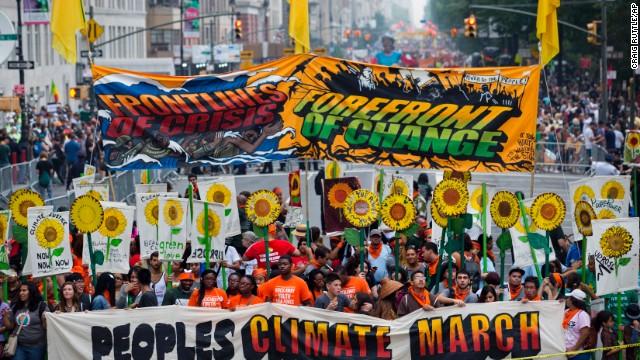
A massive and historical mobilization of communities on behalf of the environment took place at People’s Climate rallies worldwide over the weekend of 20–21 September. Students from every tradition of Buddhist practice participated, highlighting the application of ancient Dharma teachings to wise social engagement in current times. Here, we’ll consider the Lokavipatti Sutta, in which the Buddha gave teachings on what have come to be called the Eight Worldly Winds (also known as the Eight Worldly Dharmas or Conditions)—a name that is resonant with the discussion of climate change today.
The sutta states: “These eight worldly conditions spin after the world, and the world spins after these eight worldly conditions. Which eight? Gain, loss, status, disgrace, censure, praise, pleasure, and pain.”* We can use these conditions as a framework to guide and illuminate some of the factors at play in deciding how we might most skillfully engage in action aimed at shifting our culture toward sustainable use of resources and dedication to environmental healing.
Looking first at the conditions of pleasure and pain, we see that the Earth is suffering as a result of ecological crisis, as are many sentient beings in vulnerable geographical areas. Escalating drought, flooding, and superstorms are hallmarks of this devastation of our natural world. Some of us can afford to buy our way into more insulated lives, protected from the worst, most immediate effects of climate change. This pursuit of pleasure and comfort contributes to the depletion of resources, leaving poorer communities less resilient. Part of our wise practice may be to note the impact on our hearts when we observe that as some seek to avoid pain and pursue pleasure, increased vulnerability and dispossession of basic levels of security in less wealthy communities are the direct result. Turning toward the pain of this is courageous, and helps refocus our awareness on the interconnectedness of us all and upon the fragility and preciousness of our shared Earth.
The conditions of gain and loss outlined are also at play here. Some individuals (and significantly, some corporations) hold a fundamental value of acquisition and gain, always needing to get more—more resources, more wealth, more comfort, more convenience, and prosaically, more televisions, more shoes, more meat, and more toys, all of which are created out of raw materials taken from elsewhere. Somewhere, some communities had to lose in order for others to gain. When we seek to align our lives with the Buddha Dharma, we strive to step off this treadmill of gain and loss. We commit to a life of renunciation, cultivating a sense of bountiful “enoughness.” We practice a generosity and spaciousness of the heart that is then expressed through physical acts of giving, moving toward a life that flips the paradigm of gain and loss toward one of abundance and generosity.
Many mass movements have been marked by the conditions of censure (or blame) and praise. We may heap blame upon the “enemies” of our cause: those who don’t agree with us or who may still be causing grave harm to the planet. The level of heated rhetoric that can accompany discussions of climate crisis at public events (and around the family dinner table!) is an example of this urge to loudly blame others. There can be a related desire to praise those whom we hope will be saviors in shifting us off the course of disaster, or those we judge to have shouted our own position most persuasively. When we reflect upon the teachings of the Buddha, though, we may seek instead to use wise speech as a means of engaging in the painful and emotionally charged conversations that are necessary if we are to successfully shift from a culture of death toward a culture of life, in the words of Bhikkhu Bodhi.**
Considering status and disgrace, we can further observe the tendency to separate ourselves from others either by conferring approval upon their actions in regard to eco-activism or by condemning them to disgrace for what we perceive as their mistakes or environmental crimes. Some translations use “shame” in place of disgrace, pointing to the way we can even judge ourselves harshly, feeling guilty when we don’t do “enough” to combat climate change. None of this, though, leads us toward the freedom of the heart that allows us to be clear, loving, compassionate channels for the Dharma, expressed through committed action on behalf of saving our planet. It is by seeing our interconnectedness, even with those whom we may initially despise, that we transcend the separation of status and disgrace and hold instead a wise understanding of our ultimate oneness as members of the greater Earth sangha.Seeing that the Buddha’s teachings are relevant even to the most urgent crisis of our day can spur us to practice and to take action toward liberation. By seeing clearly the ways we unskillfully continue the conditions of duality that keep us trapped in the world of samsara, spinning after the world, as it says in the sutta, we gain a little bit of space from our automatic reactions in these arenas. We see that our conditioned responses may be making the situation worse, not better. In contemplating the teaching of the Eight Worldly Winds, we gain a fresh perspective on our own actions and on the ways we can practice for the benefit of all living beings now and in the future.
*Translated from the Pali by Thanissaro Bhikkhu; see Access to Insight.** See his article in Tricycle.






